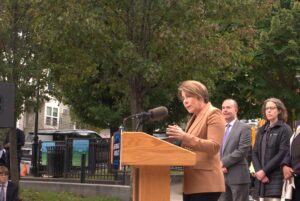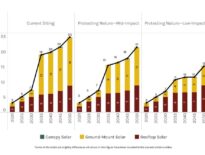
Gov. Maura Healey speaks to reporters, housing advocates, business leaders and supporters at a park in Chelsea on Oct. 18, 2023 to announce her new housing policy and finance bill. Photo by James Sanna | Banker & Tradesman Staff
Gov. Maura Healey’s $4.1 billion plan to attack Massachusetts’ housing affordability crisis is designed to generate tens of thousands of new units statewide, and includes the legalization of accessory dwelling units in single-family zones and state aid for conversions of underutilized office buildings and malls into housing.
The five-year spending plan nearly doubles the state’s previous financial commitment to housing, in what administration officials characterize as a frontal assault on rising home prices and rents.
Administration officials said the bill was “breaking the mold” of past housing policy bills, which typically focused just on financing affordable housing, due to the scale of the state’s housing needs.
“We know we have to go really big. The moment and the people in this state demand it,” Healey said at a Wednesday morning press conference in Chelsea announcing the bill.
“For over three decades, housing production has not kept pace with our population. And we have a severe housing shortage in Massachusetts. There aren’t enough homes to go around. And prices have gone up. I don’t want people leaving. I don’t want to see people struggling. We don’t want our economy to stop growing and thriving,” she added.
A growing list of obstacles to housing production – particularly higher construction costs and interest rates – have intensified the region’s housing affordability crisis. Multifamily construction levels in Greater Boston are at a 10-year low, brokerage Colliers reported this week.
Sparse inventories of for-sale properties and mortgage rate increases have devastated home sales, which hit the lowest level statewide in any September since 2010 last month, according to data compiled by The Warren Group, publisher of Banker & Tradesman.
Officials estimate Healey’s Affordable Homes Act’s passage would generate 40,000 new housing units, including 34,000 reserved for low- and moderate-income households when its policy changes and spending proposals were combined with provisions of a tax package passed a few weeks ago, including a big expansion of the Housing Development Incentive Program that helps developers build market-rate housing in the state’s 26 Gateway Cities.
In a departure from Massachusetts’ tradition of local control over zoning, accessory dwelling units up to 900 square feet would be permitted statewide on any single-family lot. Communities would be prohibited from limiting ADUs to owner-occupied properties or requiring parking for ADUs within a half-mile of transit stops, but would be allowed to pass what one official called “reasonable” restrictions governing dimension, setbacks and other rules, based on guidelines the Executive Office of Housing and Livable Communities will issue if this component of Healey’s bill makes it into law.
The plan also authorizes local officials to enact a transfer tax from 0.5 to 2 percent on residential property sales over $1 million, to be paid by sellers, with proceeds going toward affordable housing projects. Several towns and cities, from Boston to Nantucket, have filed home rule petitions with the state legislature to enact taxes like this, eliciting strong opposition from the real estate industry.
In a statement emailed to the press Wednesday morning, Greater Boston Real Estate Board CEO Greg Vasil applauded the Healey administration for “bold action to address the state’s crippling housing crisis,” but said that “[w]hile we support the goals of the bill, we have deep concerns about the inclusion of a sales tax on real estate.” Such a tax would be “an unstable source of revenue that would cause more harm than good at a time when people and businesses are leaving the state because it is just too expensive.”
At Wednesday’s press conference, though, HYM Investment Group founder and CEO Tom O’Brien and Massachusetts Business Roundtable President and CEO JD Chesloff both praised Healey’s bill, despite the transfer tax provision.
“Our government is founded on the principle of compromise and collective action. And now is the time to take big collective action on this big problem. People are counting on us. We need this to compete as a region. And we owe it to our children and our children’s children,” O’Brien said.
And NAIOP-MA CEO Tamara Small said in a statement provided by the Healey administration that ” the Governor’s proposal today tackles affordable and deeply affordable housing in the Commonwealth. NAIOP is supportive of the Governor’s goals and looks forward to working with the Administration and the Legislature in the months to come to ensure that a final bill advances housing production.”
Healey’s proposal would significantly boost spending compared with the state’s expiring five-year housing bond bill, while updating policies that affect local decision-making on housing production. The state Affordable Housing Trust Fund would increase by 100 percent, to $800 million. And the bill includes $275 million for non-traditional housing projects, including conversions of underutilized commercial properties such as office buildings, mills and shopping malls into housing.
The state also would provide $175 million for communities to upgrade municipal infrastructure that enables construction of higher-density housing under the Housing Works program.
A fund would also be set up using $50 million in state money to let the state take small equity positions in permitted-but-unbuilt housing developments having trouble getting financed while demanding a lower return than the capital markets currently do. The fund would be open to private dollars, and administration officials expressed hope they would be able to draw investments from pension funds, university endowments and foundation endowments might be interested in investments that offer social benefits despite the lower-than-market rate of return. However, they said, no “specific conversations” about the concept had yet taken place with any potential fund participants.
The biggest single financial portion of the bond bill allocates $1.6 billion for repairs and decarbonization of the state’s 43,000 public housing units.
Banker & Tradesman staff writer James Sanna contributed to this story.








